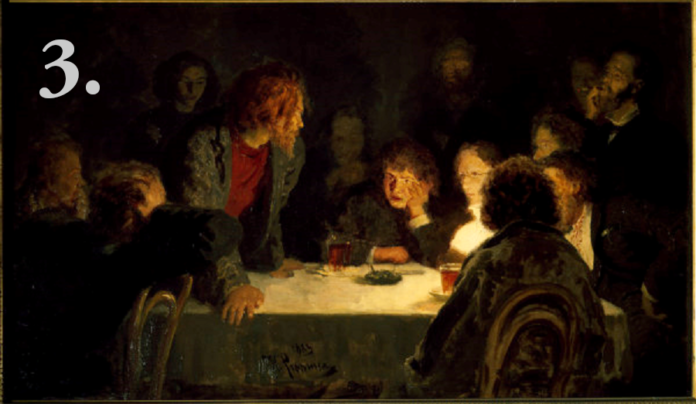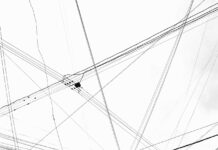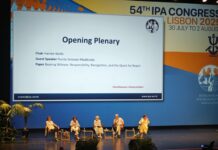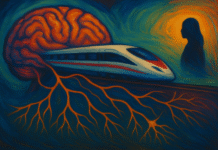This article is the last of our three part series about Underground psychoanalysis in Prague (part one and part two).
In the traumatizing conditions of political violence, the importance of the „everyday narcissism“ of the analysts often overpowered their „analytic narcissism“ (Puget, 2002); associated mainly with their work on uncovering the unconscious. It is possible that analysts expected their candidates‘ admiration, compliments, loyalty, and protection, or other forms of gratification. In the fantasy of the candidates, the analysts and the illegal analytic group could have presented themselves as endangered, highly idealized, and in need of being protected from the oppression of the outside world as well as from the potential aggression of the candidates themselves. Of course, this also led to strong feelings of loyalty towards one’s analyst to the point of supporting him/her even among other members of the psychoanalytical community. The analyst became a person in need and the patient his/her protector.
It is important to note that, for the most part, there was no cohesive psychoanalytical group in Prague to speak of. The analysts worked in isolation in their hideouts and their cooperation; sharing and publication of thoughts were limited. Some even suspected each other’s political allegiance. (After the fall of Communism, one of the analysts vaguely suggested that he had learned about a secret agent within group from the released police documents.) Under conditions of social violence, the alliance between analysts depended to a certain extent on paranoid functioning brought about by feelings of forced alliance.
Of course, the survival mode of the Prague analysis resulted in the weakening of its ethical standards. The threat that a patient could pose to an analyst was of a greater nature than that of the analyst being disciplined for his or her violation of the ethics code shared by the analytic group. For an analyst, being turned in would have meant exposing the entire group. The uncertainty prevented the members from passing judgments on other members and resulted in weekly self-regulated groups. For instance, an analyst could be accused of having sexual relations with his patient. Although the group was keen to investigate the case, the fear that the patient might go to the police was stronger than the feelings about the group’s ethical rules. Undoubtedly, the super-ego structures become corrupt under the pressure of a totalitarian regime. The feelings of guilt lose their causal and personal order and are transformed into vague feelings of guilt of the entire group.
As we know, in totalitarian regimes, the space of relations between people is greatly reduced and tends to support specific patterns between a protector and a powerless person. Because of the gradual destruction of individuality, this specific relation can become that of master and slave. In Prague, the central characters were the imposter and the controller. The task of the controller was to identify and expose the imposters, and move them back to the transparent, yet abusive, “contract” with the regime. It was accepted in Prague that people were always pretending to be someone else. Wearing a mask and the act of removing one’s mask (or having one’s mask removed) were parts of everyday life. „The Good Soldier Švejk“, one of the most tragicomic characters of Central European literature, written by Jaroslav Hašek (2005), represents this cultural tradition, and its efforts to defend one’s weakness, softness, and awkwardness are characterized by mocking bravery, using various masks and favoring absurdist, grotesque humor. The great Nazi “Reichsprotektor” in Prague, Reinhard Heydrich, who was eventually assassinated by Czech paratroopers, even called the Czechs „the laughing-beasts“, recognizing in them unreliable people who through pretence and opportunism would eventually undermine their enemy.
Characteristically, we remember the past of Prague psychoanalysis often with humor, trivialising the dangers which psychoanalysts faced at the time, but also we sometimes remember it with cynicism and with suppressed feelings of shame. Rarely do we remember it with pride and admiration. Those who take their profession and psychoanalytical identity seriously can easily become targets of jokes from others who perceive them as fakes. Perhaps this is related to the struggle in contemporary Prague psychoanalysis between those who prefer passive and domestic forms of psychoanalysis and those who would like to join the wider psychoanalytical world and the ranks of the elites – the perceived rulers. Professional ambition in psychoanalysis is often perceived as an expression of personal narcissistic issues.
Prague psychoanalytic group belonged to other groups and micro-groups which avoided conflict with the power structure. If psychoanalysis remained an alternative method of treatment and avoided direct conflict with Marxist ideology and social sciences, the Communist regime usually tolerated it in silence. In time, it became clear that this hidden and reduced form of psychoanalysis did not pose a threat. (Analysts living in dictatorial Belorussia and Russia are likely to be having a similar experience.) If one wanted to enter training, it was expected of him or her to be as politically inactive as possible – a membership in the Communist Party or a dissident group tended to be a disadvantage. Anyone who wanted to interact with the regime was putting themselves as well as their colleagues in danger. If the analysts were not opposing the regime openly, the „pact with the devil“ allowed them a relatively peaceful existence, work, and some illegally earned money on the side. Given such descriptions of the Czech character, how can one decide if Prague psychoanalysts collaborated with the regime or rebelled against it? Were they realistic and responsible, or just cowardly and opportunistic? The very act of surviving and the proven ability to persist continually have become to an extent a narcissistic triumph, forming collective confidence. Focusing on one’s own existence – and its non-obvious and uncertain nature –has become, at the very least, a latently important collective subject.
Highly idealized, underground psychoanalysis in Prague had to struggle most of the time with marginality and the threat of gradual disintegration. The founding documents of the illegal Psychoanalytical Society from the beginning of the eighties were, somewhat conveniently, lost by the then president; so, to this day, we are not exactly sure when the society was created. We only have very little information about the fifty years of psychoanalysis in Prague. There is no archive which would contain records of meetings and discussions; there is not even a list of topics for the seminars, let alone photographs. Surely there are many good reasons for this lack of documentation – there were efforts to cover all the tracks which could have been used by the state police against the members; it may also have appeared insignificant to record this „small history“ (Šimečka, 2011). Thus, we have but sporadic notes which have outlived many of our psychoanalytical predecessors. We learn about them mainly from others‘ accounts, and sometimes all tracks are lost completely.
Of course, our lengthy experiences with totalitarian regimes still affects the present. All these mostly unconscious patterns have great inertia. To liberate oneself from the survival mode and create a good cohesive „Heimlichkeit“ with a more trustful vision of reality, lively dynamics was required to work through the paranoid anxieties. The „protector–victim–persecutor“ pattern, the fears of being exposed, unmasked, expelled, or destroyed should be analyzed and processed. To this day, “tanks in bedrooms” are invisibly present in the mentality of the older generation, but they are also passed on through „telescoping“ (Faimberg, 2005) to the younger members of our society. Particularly in tenser situations, in which the Society occasionally finds itself, the old ghosts kick in and lead to searching for hostile elements on the inside. Instead of searching for dialogues and mutual recognition, interpretation is used to brand and eliminate opponents. In this context, the gradual institutionalization of our Society, and every endeavour to improve on its byelaws and ethical code are shadowed by fears of new forms of persecution. Only in recent years have we grown comfortable taking group pictures and collecting documents for our archives. And it has taken twenty years since the fall of Communism for the Society to agree to acquire its own registered premises.
A thick line drawn between the present day and our Communist past and the distrust felt towards exploring the past diplomatically overlook or trivialize certain aspects of our history. For example, former members of the Communist Party among analysts are not asked to provide justifications and they themselves still avoid such discussions. Gradually and with great effort, we have begun to overcome our own alienation from the past, and we have begun to appreciate our predecessors to whom we did not feel previously connected.
The young generation of the Prague analysts attempts to establish communication between their home and the rest of the world. One of its tasks is to find a way out of the domestic forms of analysis and the retreats derived from the times of oppression. One of the emerging topics is xenophobic disbelief in positive changes inspired by the outside environment and the fear of disappearing in a foreign world. Our lagging behind modern advancements in psychoanalysis that have been evolving continually and without major traumas raises important questions about our own limitations regarding the quality of psychoanalytic culture. At the same time, our obvious handicap encourages us to train a new generation of candidates and analysts who are less affected by the past.
Our Society is slowly, but continuously, turning itself into a safer place where free discussions, creative thinking, and good mutual relationships have their legitimate place. Its future is dependent on devoting enough time without the traumatic presence of “imposing worlds”. Prague psychoanalysis reflects also positive aspects of Central European mentality – in a way, it has been the bridge between the West and the East. Our institute has become an important center for training Eastern European candidates (from Russia, Belarus, Ukraine, Baltic countries, Georgia and Kazakhstan). Only now do we begin to appreciate psychoanalytic politics as an important and beneficial concept, and not simply as something ominous and inappropriate for the interest of psychoanalysts. This change is undoubtedly a result of our more wholesome perception of the rapidly evolving external reality during the past twenty years (Šebek & Mahler 2014).
This was the last part of our three part series about Underground psychoanalysis in Prague.
References
- Faimberg, H. (2005). The Telescoping of Generations: Listening to the Narcissistic Links Between Generations. The New Library of Psychoanalysis. Routledge.
- Hašek, J. (2005). The Good Soldier Svejk: and His Fortunes in the World War. Penguin Classics
- Puget, J. (2002). The State of Threat and Psychoanalysis: From the Uncanny that Structures to the Uncanny that Alienates. Free Associations: Psychoanalysis, Groups, Politics, Culture(9), pp. 611–648.
- Šebek, M., & Mahler, M. (2013, July/August). The Czech Psychoanalysis and the Concept of External Reality. Paper presented in the 48th IPA Congress, Prague, CZ.
- Šimečka, M. (2011). Kruhová obrana. Praha: Artforum.




